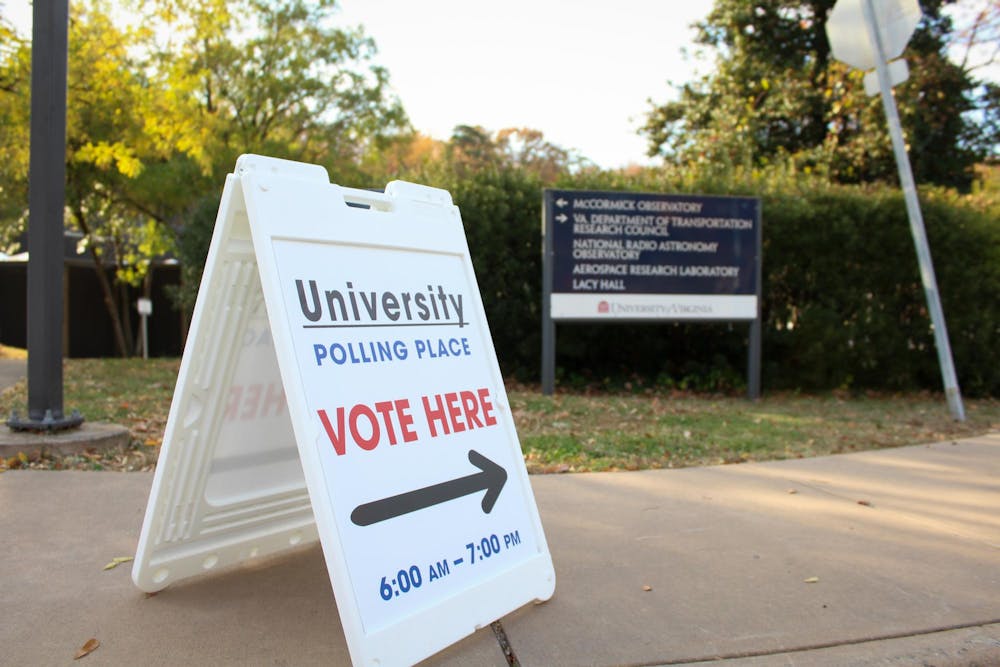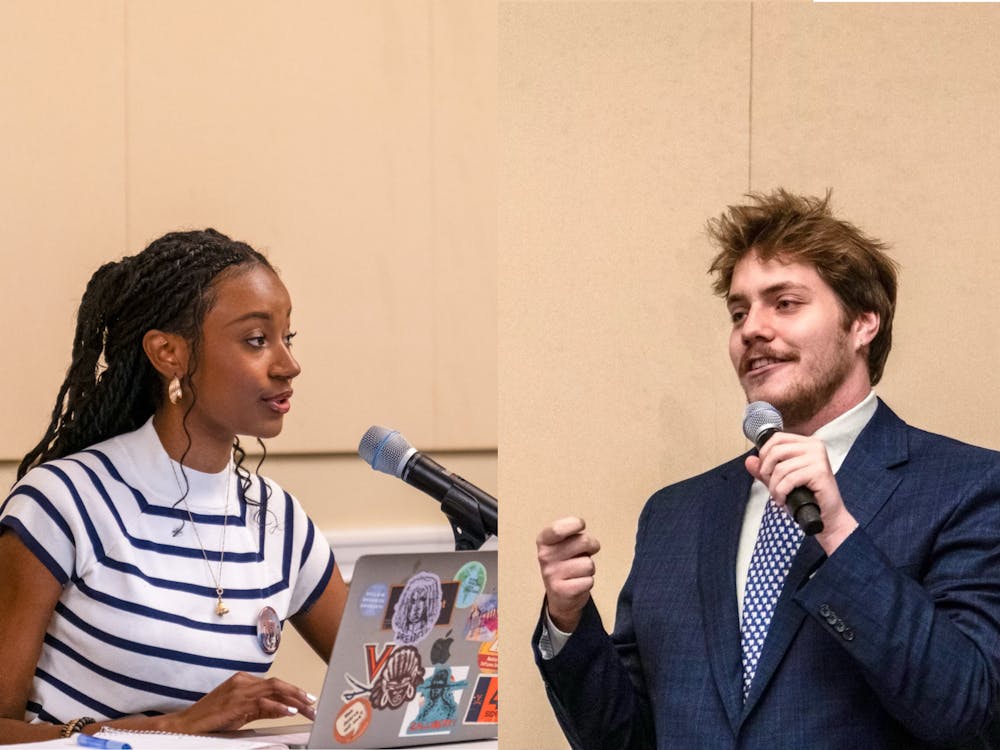As campaigns ramp up in a year that promises a change in national leadership, one class at the University titled PLAP 3500, “Election 2024,” will use political science principles to make sense of the historic election. Meanwhile, professors in other departments, from media studies to history, are emphasizing this year’s election as a way to discuss American democracy more broadly.
‘Election 2024’ examines campaigns during presidential election years — as well as other topics in political science, like election forecasting — with the guidance of a two-person teaching team. While some courses at the University are also taught by two professors, the class is unique in that it is taught by professors on opposite sides of the political spectrum. Politics Prof. Mary Kate Cary and Jennifer Lawless, politics and public policy professor, come together in this class to offer a bipartisan perspective on current events with regard to the election cycle.
Cary, who served as a White House speechwriter for former President George H.W. Bush, spoke on a “class agreement” — that everything said in class is off the record, and that students should remain curious about new information, not judgmental of others’ viewpoints. Cary also said that she and Lawless hope to model proper civil discourse to students so they can evaluate both perspectives and decide for themselves where they land on an issue.
“Part of our commitment to viewpoint diversity is you learn more when you hear both sides of the argument,” Cary said. “We’re trying to show how reasonable people can agree to disagree, and that’s how we all learn.”
According to Cary, classes begin by laying out facts that both professors agree on before moving onto opinionated takes on different policy issues.
Lawless, who sought the Democratic nomination for Rhode Island’s second congressional district in 2006, also said the two professors want to model civil discourse and show that agreeing on issues is not necessary to respect each other.
“Moving forward … [means] listening and respecting the other side’s opinion and trying to figure out where there is common ground,” Lawless said. “Even when there’s not, demonstrating a degree of respect in tone and tenor.”
So far, students seem to appreciate the difference in opinion offered by Cary and Lawless.
Second-year College student Maggie Chang, who is enrolled in the class, said she enjoys the format of the class, and that having two people from different sides of the political spectrum makes the class more dynamic and provides a diverse atmosphere.
“It’s really great to see a class where there’s a diversity of ideas in the audience, but also on the stage,” Chang said. “When people are getting concerned about polarization in education nowadays, I think this is a really good example of how we can work against that.”
The class, which is only offered during presidential election years, was first offered in the Fall 2020 semester. However due to COVID-19 restrictions, the 223 students enrolled in the course in 2020 had classes entirely online. Cary said the online format of the class made it difficult to create an interactive, engaging course.
This year’s in-person format, with over 400 students enrolled, is something that Cary prefers, as she said she values being able to see and hear the reactions of students on different topics.
“We get much more of a sense of feedback from the students, and specifically laughter,” Cary said. “To me, half the fun is just interacting in person and being able to see what’s going over and what’s not.”
The in-person version of the class also affords the ability to collaborate on assignments. Lawless listed some benefits of holding class in person, including that students are able to work together.
“There’s a final project in this class that involves group work, and that’s a lot easier to do when the students can actually meet together in person,” Lawless said. “[In person class] allows for more meaningful interaction among students who might not ordinarily speak to each other.”
At the end of the course in 2020, the professors surveyed their students and asked whether they would like to see more politics classes co-taught by a liberal and a conservative and 89 percent of respondents said yes. Given the student approval of this teaching model, Cary said she had hoped the class would open the door to other classes being co-taught by a liberal and a conservative in subjects like economics and religion.
Another unique aspect of the class is the guest speakers who come frequently to talk about their areas of specialties, such as journalists and campaign staffers. Second-year College student Jonah Linker said that the guest speakers are the most interesting part of the class for him because of the first-hand political experiences they bring when speaking to students.
“I think the whole point of the class is to bring in many different viewpoints,” Linker said. “With the guest speakers and the two professors, it’s way more interesting to hear about the election that way than just from one person.”
Other election-focused classes offered this semester include PLAP 3140, “Mass Media and American Politics,” and PLAP 4180, “Political Advertising and American Democracy,” both taught by Assoc. Politics Prof. Paul Freedman. The former focuses on media coverage of elections and how media outlets portray and represent campaigns, while the latter focuses on how candidates seek to get their message out to voters and how the delivery of that message has changed over time.
According to Freedman, both of the classes will be looking at the campaigns’ advertisements as well as those from other political organizations. Freedman said he uses the example of the election to help students generate their own thoughts about politics and the media, but that it can be a challenge to prevent students from simply reciting what they have read online instead of forming original opinions.
“I’m very lucky that I have a real time example playing out every single day that I know most or all of my students are paying attention to,” Freedman said. “The challenge is to keep it tight, to keep it focused and to be thoughtful and creative in using the example of the election to illustrate the larger points that we’re reading about.”
The Media Studies Department is also offering an election-related course this semester. MDST 3510, “Democratic Politics in the New Media Environment,” taught by Media Studies Prof. Bruce Williams, is a seminar where students will work in small groups over the course of the semester to research different topics like the interaction between social media and politics, while still tracking the presidential campaign.
Williams said he wanted to keep his class structure flexible, allowing new developments in the election cycle to help determine the week-by-week focus of the course. This decision is demonstrated in the syllabus, which simply says “TBD” in the final weeks.
“I change topics, spend more time on them, change focus, depending on how the students are reacting to things and what’s happening in the world,” Williams said. “I’m really interested in how students are thinking about the election, and it’s a small class … so it’s easy to change things up as we go along.”
One class that focuses on a more specific policy area highlighted by this election is HIUS 2559, “The U.S.-Mexico Border: History, Policy, and Theory,” taught by Assoc. History Prof. S. Deborah Kang. The new class will look at how the history of the United States.-Mexico border has been documented and examine major policy issues affecting communities along the southern border, such as immigration, water policy and urban planning.
Having been a resident of multiple states along the southern border in her life, Kang said her major motivation for creating this class was her frustration with the media’s tendency to misrepresent communities along the southern border and neglect the border’s rich history.
“During every election cycle, the issue of immigration and the border come up, and for a [former] border resident like me, it’s always a frustrating time because the way the border gets talked about by policy makers and politicians doesn’t reflect the reality,” Kang said.
To illustrate modern depictions of the United States-Mexico border, Kang said that the class has utilized images from this year’s Republican National Convention. Kang also said the class will compare contemporary representations of the southern border with historical images.
She said she hopes students will better understand the backstory to present day policy decisions by making connections between the representation of the United States-Mexico border in the past versus today.
“The [southern] border has a long and rich history,” Kang said. “By the end of the class, I hope students take away a much more sophisticated and nuanced understanding of the border.”
As of the deadline to add or drop classes, all of the discussed election classes were near or at full capacity.






